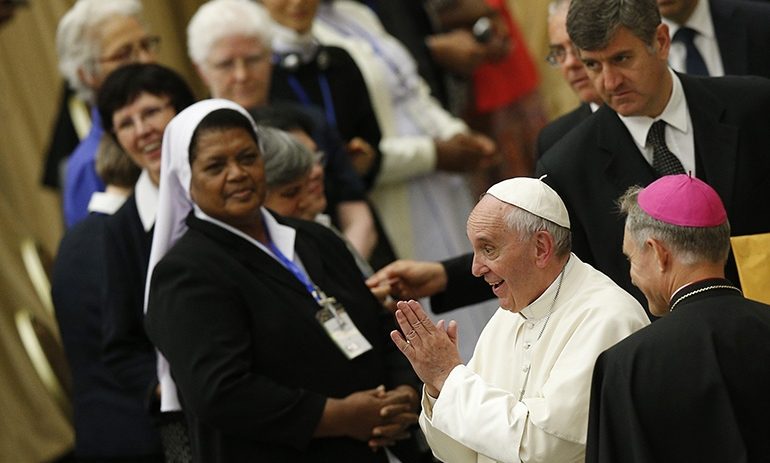Pope Francis has started a committee to explore the possibility of women as deacons in the Roman Catholic Church. It is composed of twelve people, six men and six women, actually allowing women to express agency in a decision-making body determining their own future in the Church.
For a lifelong Catholic feminist whose earliest career aspiration was sainthood, it is hard to overstate how pivotal this moment is.
While allowing women into the diaconate is a valuable first step to allowing them into the priesthood, it is important to acknowledge that deacons are “servants of all” according to the Catechism of the Church. Women in the diaconate would be doing the same job that men have done for thousands of years, but this job is to be a sort of priest’s assistant. Allowing women in the diaconate is equivalent to allowing women to be secretaries to all-male cohorts of CEO’s.
According to the catechism, women are not permitted to be ordained as deacons and priests because only men were ordained as the first apostles. The Lord made the decision to ordain only men and thus the Church ordains only men.
This explanation defies reason. In elementary logic, if only those with B characteristic are group members, that does not necessarily mean that those with A characteristic cannot be group members. Simply because Jesus only chose men to be his apostles does not mean that only men can be priests. There is no evidence that Jesus purposefully chose only men; there is no evidence in the gospel that he said women were unfit to be priests or that the priesthood and the nunnery were to be separate with separate purposes on the basis of gender. The Catechism is correct in arguing that we must be bound by choices “made by the Lord himself.” But there is no reason for gender of apostles to be considered to be a choice so lofty that only the Lord could make the decision. Because there is no logical basis to bar women from the priesthood or elevate nuns to the same responsibility level, the only explanation for barring women is institutional fallacy.
The Catholic Church is made up of humans, all of whom sin. Even the apostles, who chose their successors, and those successors as well, were sinful. Even saints sin. Even they are susceptible to believing that certain humans are above others, that women are not as spiritually whole, that women are not as intelligent, that women are not worthy leaders.
However, the Church continues to pretend that excluding women from the priesthood is ordained by God, simply masking discrimination with piety and tradition. In the Catholic faith, the pope is considered “the living vicar of Jesus Christ on Earth.” Simply because of their gender, women are not even considered to be the closest representative of Jesus Christ on Earth. Because women are not permitted to become priests, they are denied the possibility of becoming bishops and cardinals. Thereby, women are prohibited from exercising a vote in the conference of cardinals to choose a pope. Allowing women to become deacons would hopefully open up the possibility of women in the priesthood, or at least nuns with all the duties and responsibilities as priests. Excluding women from the papacy effectively argues that mortal women are inherently incapable of receiving God’s highest grace, while throughout history, they have received this grace.
God deliberately chose the Jewish matriarchs: Leah, Rachel, Rebecca, and Sarah. He also chose the Virgin Mary, the human woman without sin, to carry Jesus and raise him. Mary was worthy of God’s child, while her husband Joseph is barely even mentioned in the Bible. Mary was held closer to God than her husband was. Women must be capable of grace and extraordinary piety; therefore nuns should be able to lead parishes in prayer and administer the eucharist. There is no reason to continue to discriminate against women, pretend that women cannot be leaders, and that they are unsuited to reciting prayers that the world would not have known without the Virgin Mary’s sacrifice, all the while disguising this as religiously valid. It is time that the Church recognize that its prohibitions against women in the priesthood and the diaconate are based not upon any divine command, but upon human, institutional error.

